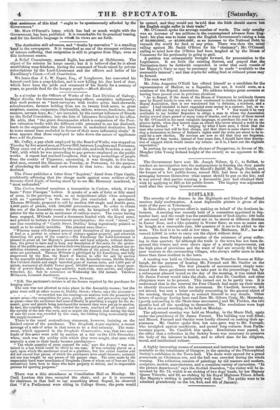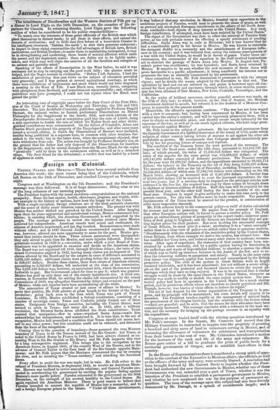SCOTLAND.
The severity of the distress in the Highlands and Islands of Scotland receives daily confirmation. A most deplorable picture is given of, the state of the poor at Tobermory.
In Ross-shire, a vigorous effort is making on behalf of the destitute la- bourers. A meeting was recently held of a committee appointed in Sep- tember last; and the result was the establishment of food-depots: 500 bolls of oat-meal and 500 of barley-meal are to be stored at different districts in Easter Ross, and a like quantity in Wester Ross; as soon as maize can be bought at a reasonable rate, 500 quarters of it are to be added to the store. The food is to be sold at low rates. Mr. Matheson, M.P., has ad- vanced 2,0001. in order to carry out the object without delay.
Accounts from Paisley make mention of the existence of great suffer- ing in that quarter; for although the trade in the town has not been de- pressed this winter, and even shows signs of a steady improvement, yet the high price of provisions and the want of fuel are severely felt by the poor weavers in the surrounding villages, who always suffer more in slack times than those resident in the town.
A meeting was held on Christmas eve, in the Waterloo Rooms at Edin- burgh, for the purpose of hearing Mr. Ferrand and Mr. Oastler on the Short-time question. The first placards of announcement simply men- tioned that these gentlemen were to take part in the proceedings; but, by a subsequent placard issued on the day of the meeting, it was stated that Sir James Forrest would take the chair, and that Dr. Candlish and other clergymen were to be present. This turned out to be partly true. It is understood that in the interval the Free Church had made up their minds to identify themselves with the movement. Dr. Candlish, however, did not attend, but sent a letter cordially concurring in the general object of the meeting, though refusing to commit himself to any details. Other letters of apology having been read kern Mr. Gibson Craig, Mr. Macaulay, (partly concurring in the Short-time movement,) and Mr. Fielden, the two apostles had all the speaking to themselves. The resolutions were kept back for a second meeting, to be held on Monday.
The adjourned meeting was held on Monday, in the Music Hall, again under the presidency of Sir James Forrest. The building was well filled; and Messrs. Ferrand and Oastler were loudly cheered on making their ap- pearance. Mr. Oastler spoke first, but soon gave way to Mr. Ferrand; who inveighed against machinery, and quoted long extracts from Parlia- mentary papers. Dr. Candlish also spoke. Resolutions were passed, to the effect that a reduction in the factory hours was necessary to preserve the body of the labourer in health, and to afford time for his religions, moral, and intellectual culture.
A highly interesting means of amusement and instruction has been made available to the inhabitants of Glasgow, in the opening of the Philosophical Society's exhibition in the Town-hall. The doors were opened for a grand promenade on Christmas eve, and the hall was crowded during the whole evening. The collection consists of paintings by old masters and modern, sculpture, models, manufactures, and a countless variety of curiosities. "In the picture department," says the Scottish Guardian, "the visitor will be in- terested by No 75, which is an etching of two dogs' heads, by her }Neely Queen Victoria; and 23, an etching by his Royal Highness Prince Albert. Her Majesty's etching is particularly well done." The public were to be admitted gratuitously on the 1st, 2nd, and 4th of January.
The inhabitants of Dunfermline and the Western districts of Fife got up a dinner to Lord Elgin on the 16th December, on the occasion of his de- parture for Canada. In returning thanks, Lord Elgin gave the following outline of what he considered to be his public responsibilities- " To watch over the interests of those great offshoots of the British race which plant themselves in distant lands; to aid them in their efforts, and extend the domain of civilization; and to fulfil that first behest of a benevolent Creator to his intelligent creatures, 'Subdue the earth'; to abet their generous endeavour; to impart to these rising communities the full advantages of British laws, British institutions, and British freedom ; to assist them in maintaining unimpaired, it may be in strengthening and confirming, those bonds of mutual affection which unite the parent and the dependent states: these are duties not to be lightly under- taken, and which may well claim the exercise of all the faculties and energies of an earnest and patriotic mind." Speaking of the effects of Emancipation in the West Indies, he said it was necessary not to stop in carrying out the good work fully: the planter must be helped, and the Negro trained in civilization. " Before I left Jamaica, I had the satisfaction of perceiving that just views on the subject of education prevailed very generally; and I was present at several agricultural meetings, at which there were exhibitions of implements and stock which would not have disgraced a meeting in the West of Fife. I saw Black men, recently slaves, competing with ploughmen from Scotland, and sometimes not unsuccessfully; and, whatever patriotism may have prompted, I could not but rejoice when the Black man gained the prize."
An interesting case of copyright came before the Jury Court of the First Divi- sion of the Court of Session on Wednesday and Thursday, the 23d and 24th December. The late Archibald Constable, publisher, applied to Professor Dugald Stewart, the eminent writer, to furnish preliminary Dissertations on Mental Philosophy for the Supplement to the fourth, fifth, and sixth editions of the Encyclopedia Britannica; and at completion paid him the sum of 1,6001., being a sum equivalent to double the rate at which Sir Walter Scott and other distin- guished contributors were remunerated. On the failure of Constable, Adam and Charles Black purchased the property of the Encyclopredia; and after some years issued a seventh edition, in which the Dissertations of Stewart were included, besides being published in a separate form, in common with other treatises fur- nished to the work; but in the latter form, when the complainant objected, they were withdrawn from sale. The action was brought by Professor Stewart's son, on the ground that his father had only disposed of the Dissertations for insertion in the Supplement; and he craved damages from the Messrs. Black for the copies " piratically " sold by them in the subsequent edition, as well as in a detached shape. The Jury found for the defendants; a verdict that was hailed by a burst of applause in court.































 Previous page
Previous page